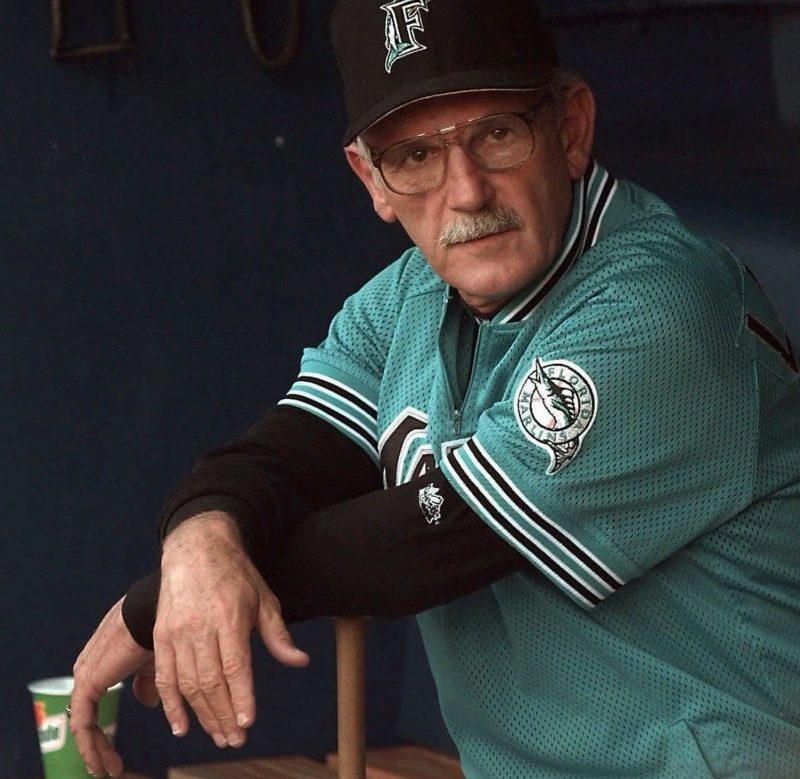
Hall of Fame: Jim Leyland earns election; Lou Piniella comes up short
Jim Leyland, who guided the Florida Marlins to their first World Series title and later won two American League pennants managing the Detroit Tigers, was elected to baseball’s Hall of Fame on Sunday night.
Earning 15 of 16 votes from a committee considering non-playing personnel whose careers stretched past 1980, Leyland, 78, won 1,769 games during a managerial career that began in Pittsburgh and included stops with the Marlins, Rockies and eight final seasons with the Tigers. He managed Detroit to the 2006 World Series in his first year with the Tigers, later advancing to the 2012 World Series and then to the 2013 AL Championship Series in his final season.
Only Lou Piniella — whose Reds defeated Leyland’s Pirates in the 1990 NLCS — also came close to earning election Sunday, as he garnered 11 votes from the 16-person committee; 12 were required for election. Former league executive Bill White earned 10 votes while managers Cito Gaston and Davey Johnson, umpires Ed Montague and Joe West and executive Hank Peters each received less than five votes.
Leyland, as gruff and old school a baseball man as one could imagine, was a true throwback whose penchant for smoking evoked visions of bygone eras. Yet Leyland consistently connected with and earned the trust of his players, all the way until his final season in Detroit, when he won 93 games at the age of 68. His 1,769 victories rank 18th all time and he won six division titles and three Manager of the Year awards.
His managerial stint helped fulfill a big league dream for a player who batted just .222 in a seven-league minor league career that peaked with a half-season of Class AA ball. Leyland never forget those humble roots, even as he managed a handful of all-time greats and future Hall of Famers, from Barry Bonds in Pittsburgh through Miguel Cabrera and Justin Verlander in Detroit.
HOT STOVE UPDATES: MLB free agency: Ranking and tracking the top players available.
‘Being not a very good player myself, I realized how hard it was to play the game,’ Leyland said Sunday night on a video conference. ‘When you saw guys like Bonds and Cabrera and Verlander and (Max) Scherzer and (Gary) Sheffield, you marvel at how good these guys really are.
‘I tried to teach them how to be a professional early on. I think young people, young players, are really searching for discipline. We all have our insecurities. Sometimes players do. I think they’re always looking for that leadership. I tried to impress upon them what it means to be a professional and how hard this game is to play.
‘And how good they were.’
Leyland’s big league managerial career began with an 11-year stint in Pittsburgh, where he helped revive the moribund Pirates and claimed three consecutive NL East titles. But the Pirates found only heartbreak in the NLCS, losing in 1990 to the Cincinnati Reds and in 1991 and ’92 to the emerging Atlanta Braves powerhouse, the latter defeat coming on a crushing ninth-inning, Game 7 single.
His glory would come in 1997, when, frustrated by the Pirates’ low-budget bleeding of talent like Bonds and Bobby Bonilla, he leapt to the expansion Marlins, who splurged on a star-studded roster in their fifth year in existence. It was also the third year of the wild card, and Leyland’s Marlins upset the Braves in the NLCS before defeating Cleveland in the World Series — on a Game 7 ninth-inning single that eased some of the sting of Leyland’s near-miss with Pittsburgh five years earlier.
That Marlins team was emblematic of the good fortune Leyland had throughout his career, with talented stars like Sheffield, Bonilla and Moises Alou. Yet it also included key role players like Craig Counsell and Jim Eisenreich and emerging youngsters like shortstop Edgar Renteria, who got the game-winning single in Game 7.
All benefited from Leyland’s egalitarian approach.
‘I cannot treat you better than the 25th player on this ballclub,’ says Leyland of his approach toward star players. ‘I think veteran players respected that.’
The 16-person committee included Hall of Fame players Jeff Bagwell, Tom Glavine, Chipper Jones, Ted Simmons, Jim Thome and Joe Torre and former MLB commissioner Bud Selig.
‘I felt for all the managers not getting in,’ says Leyland. ‘I’m hoping that their day comes.
‘Today, I was the fortunate one.’
